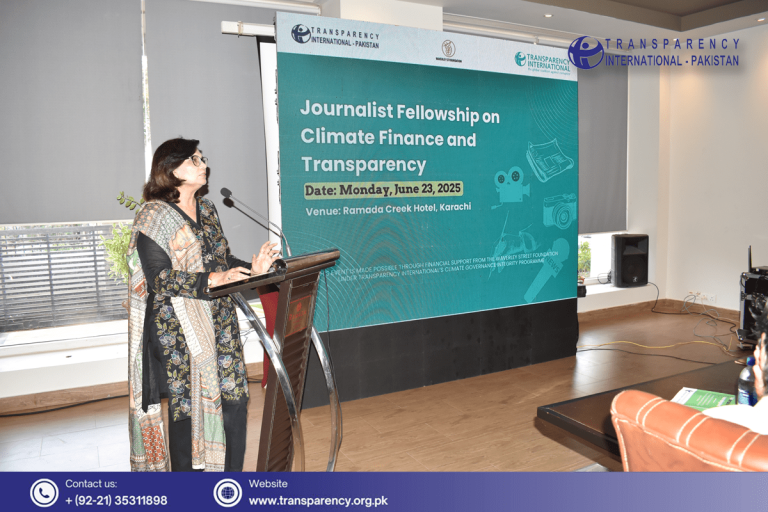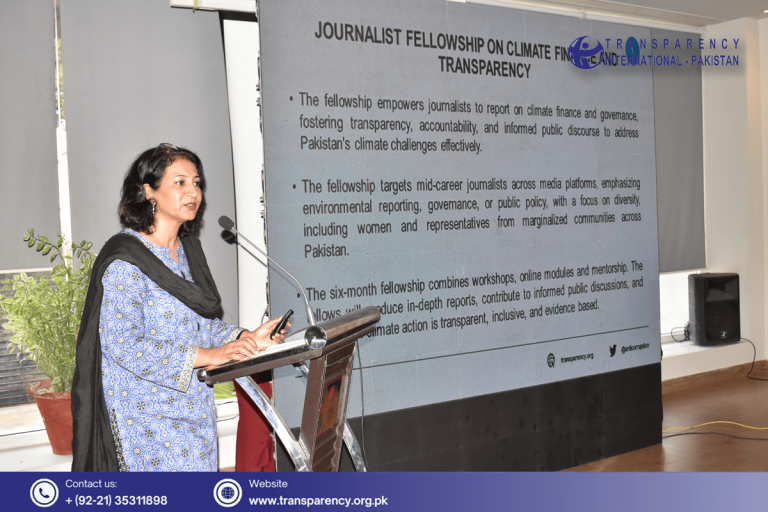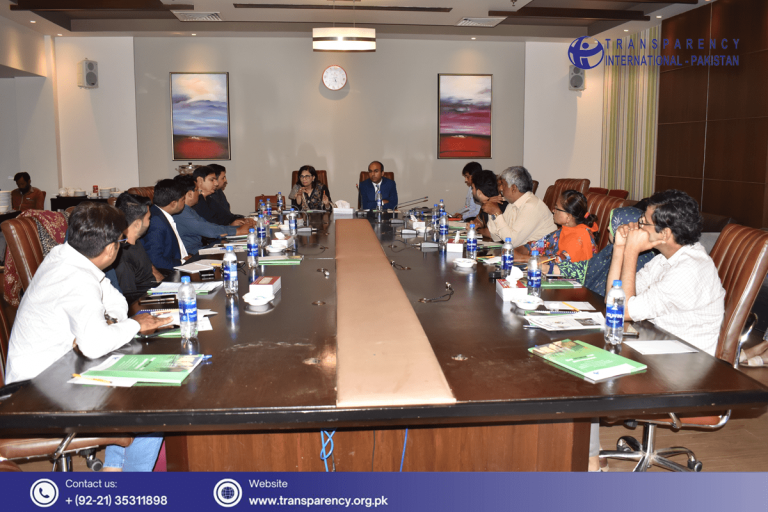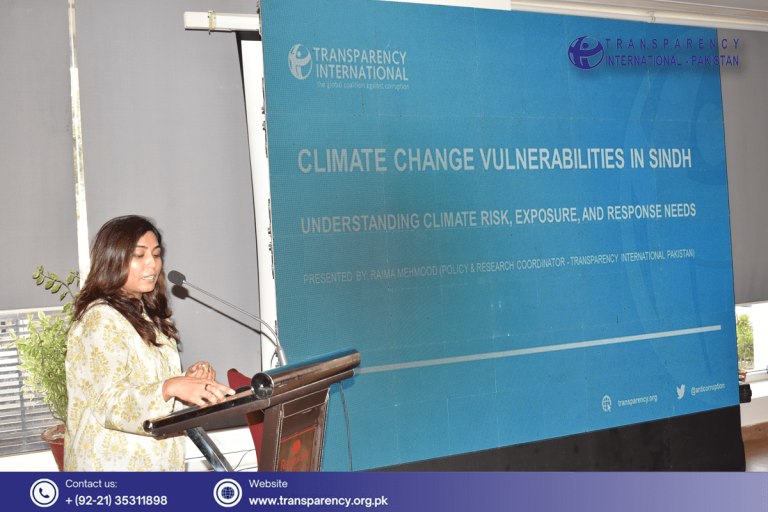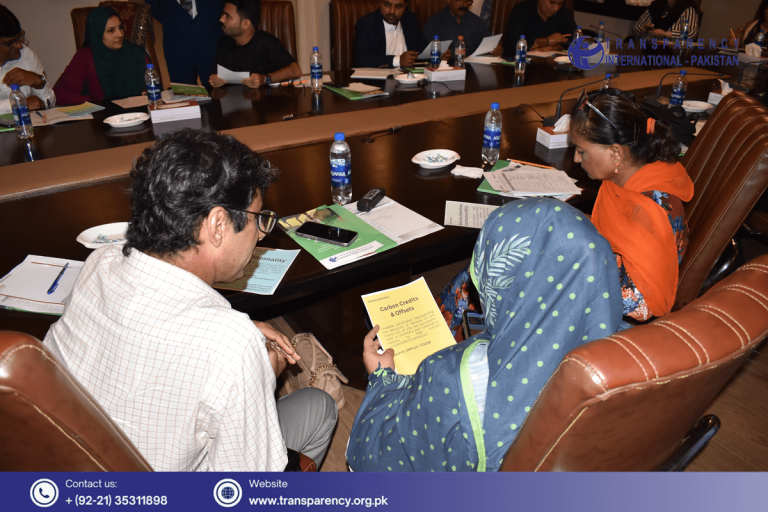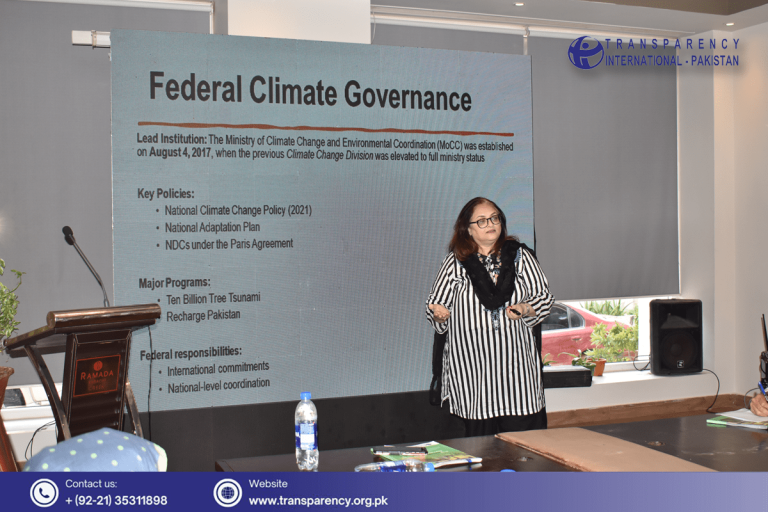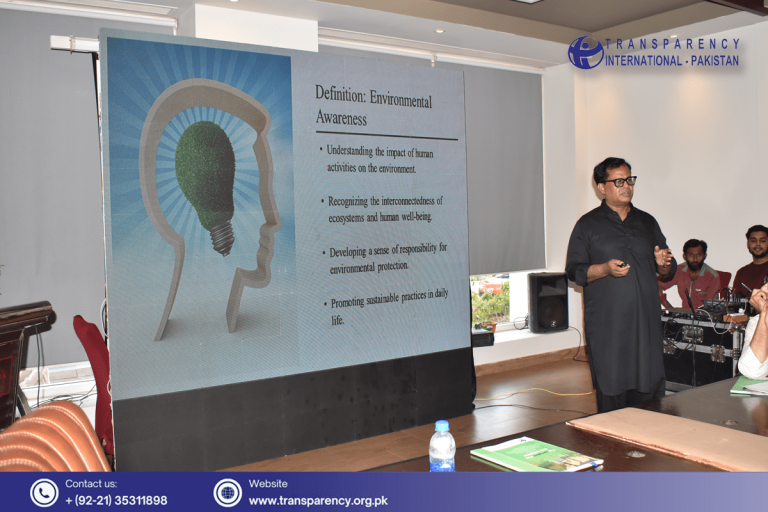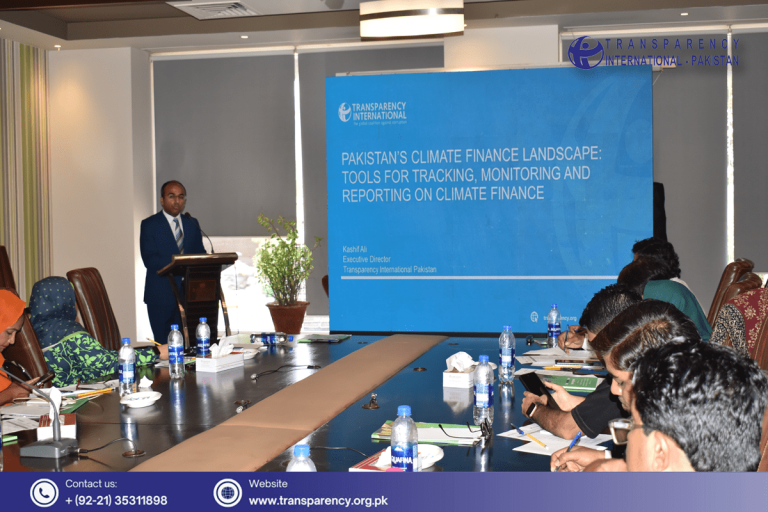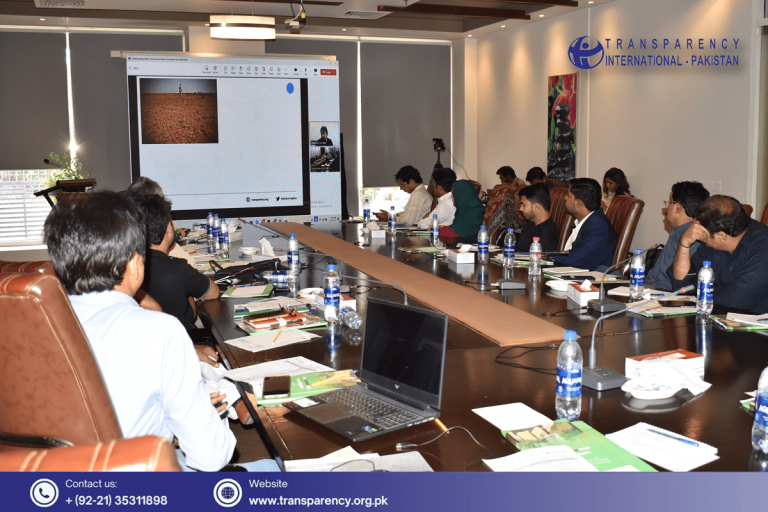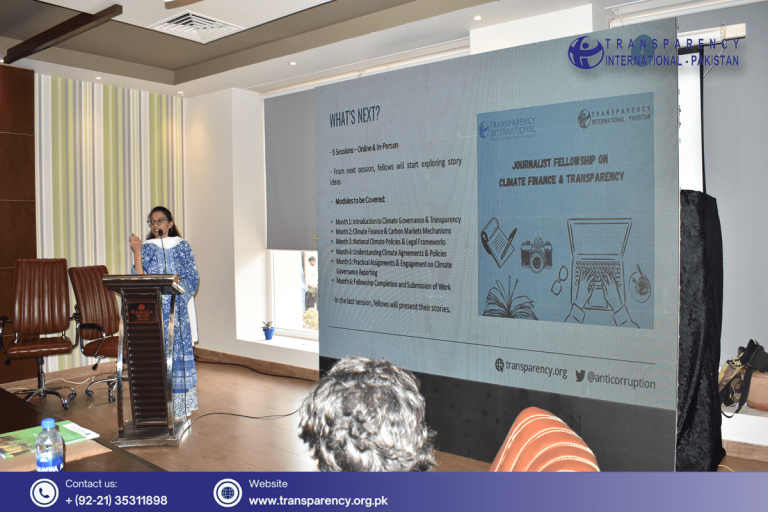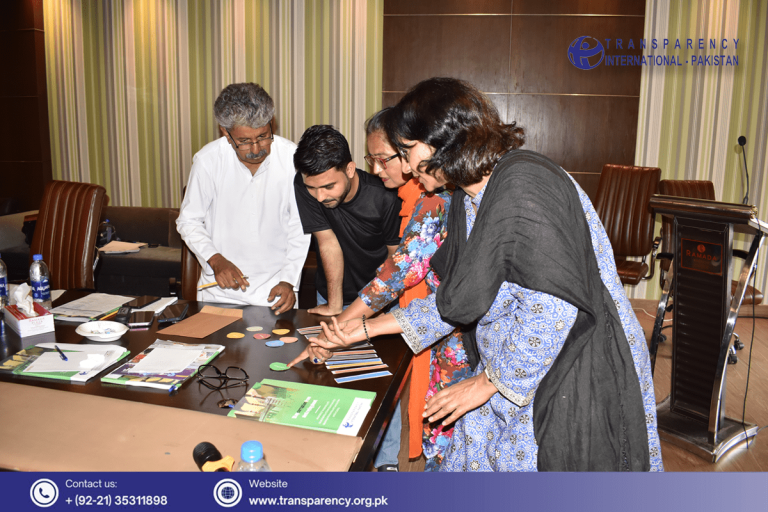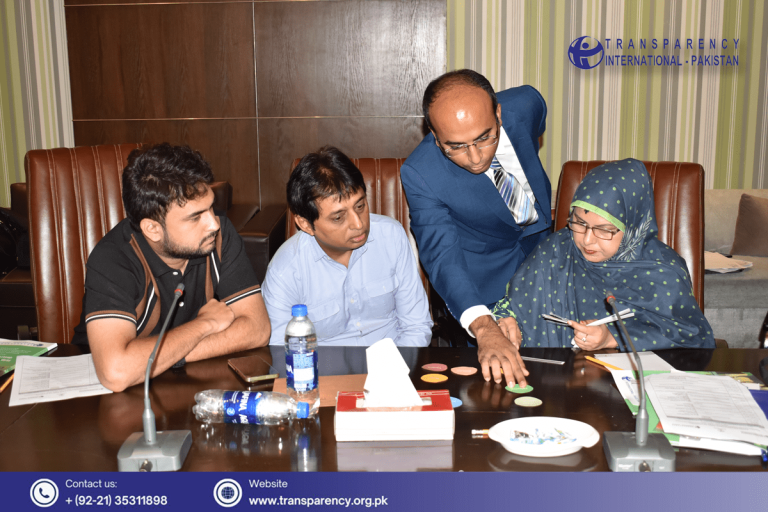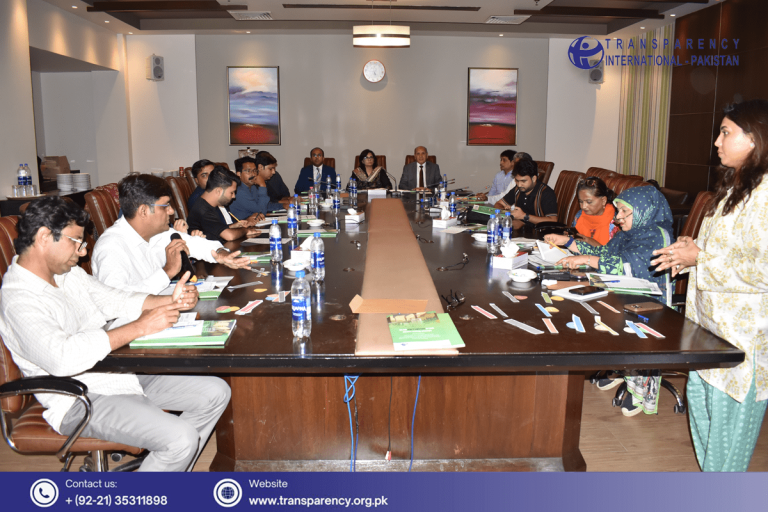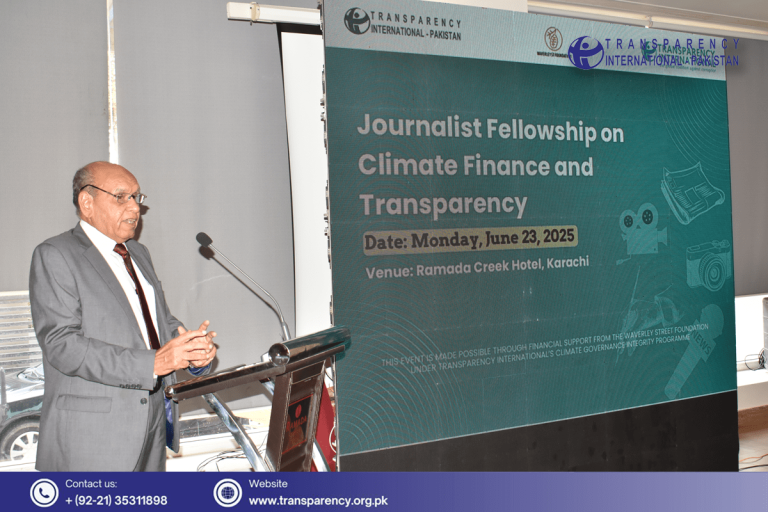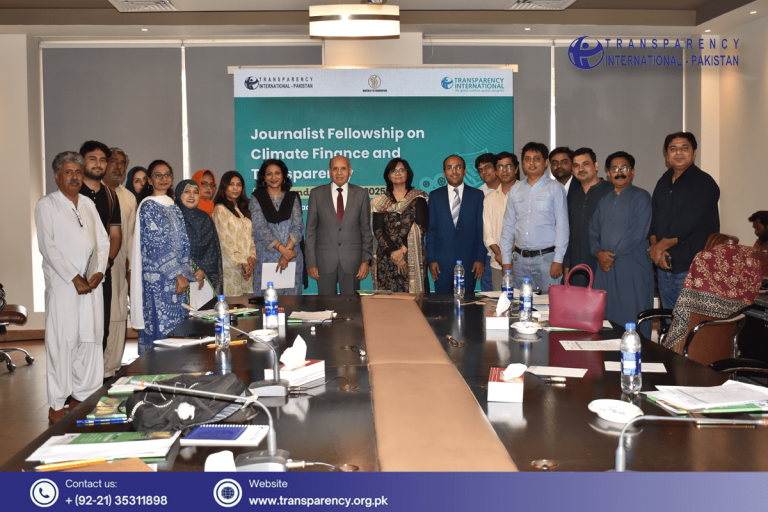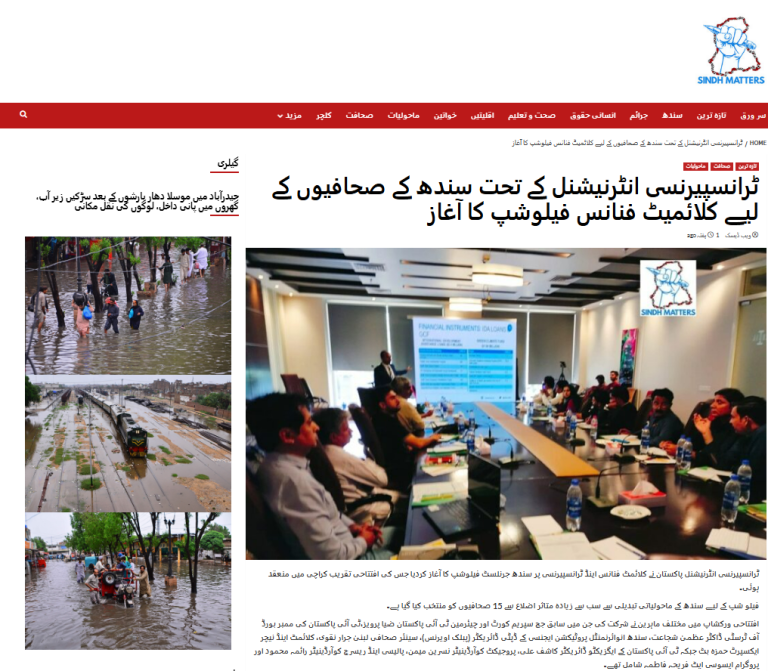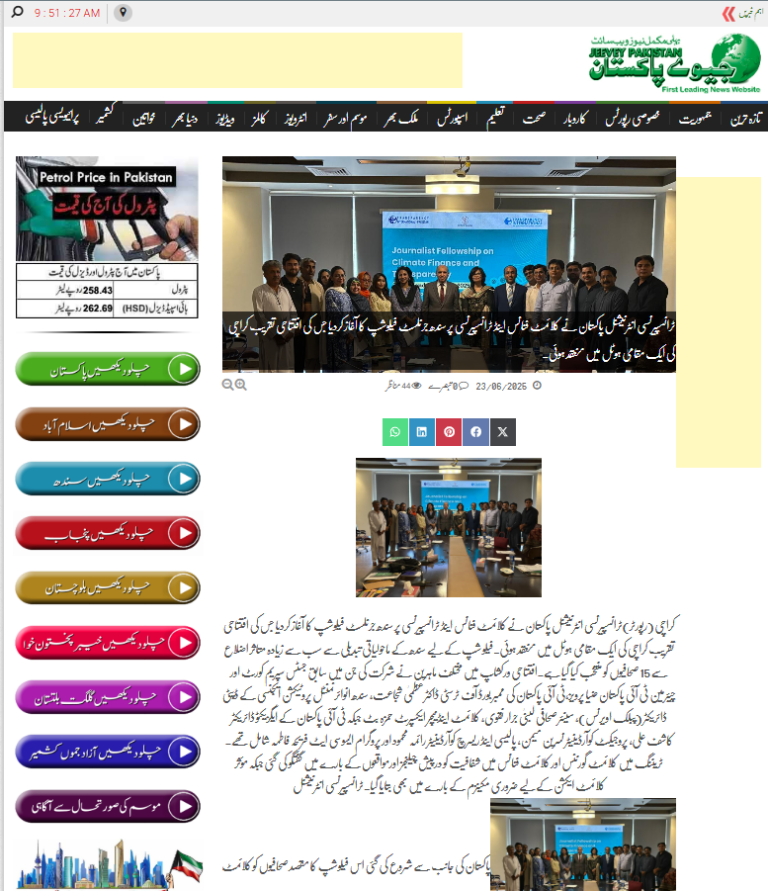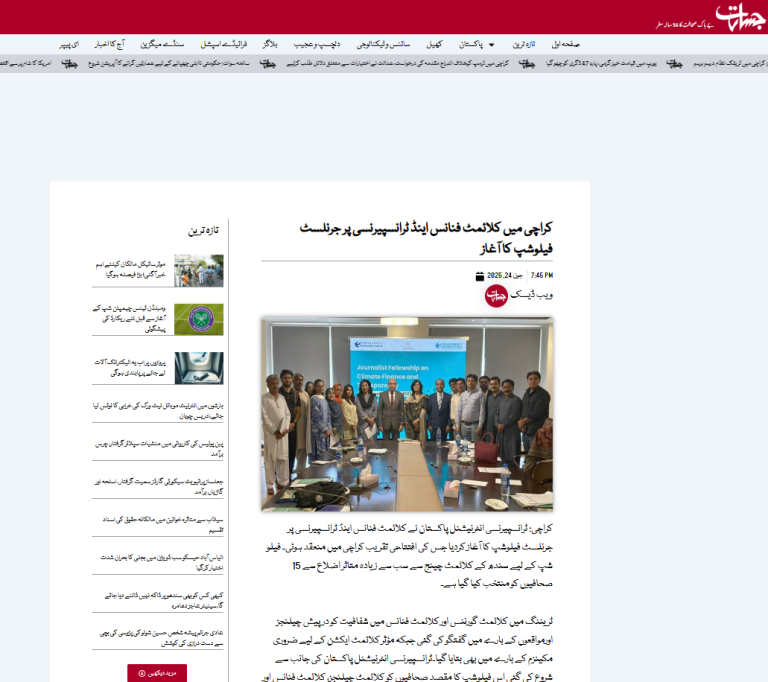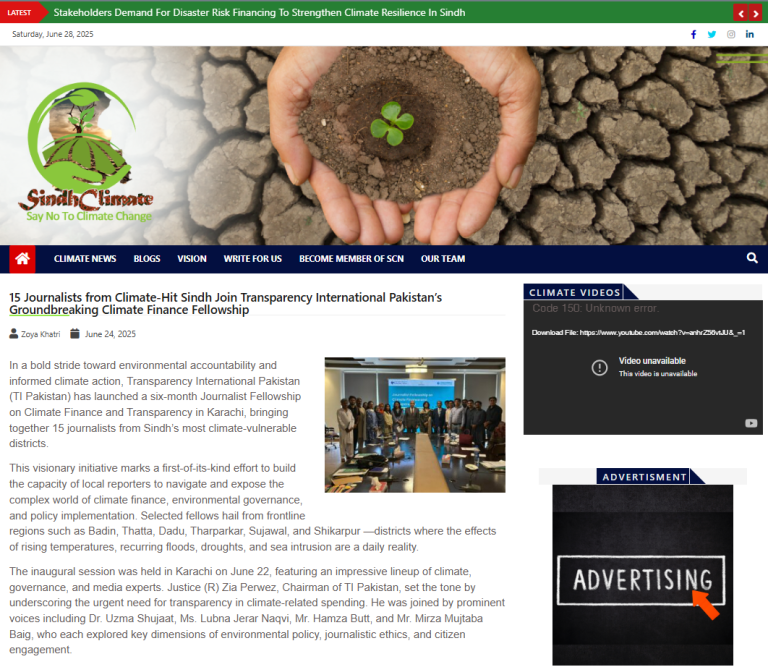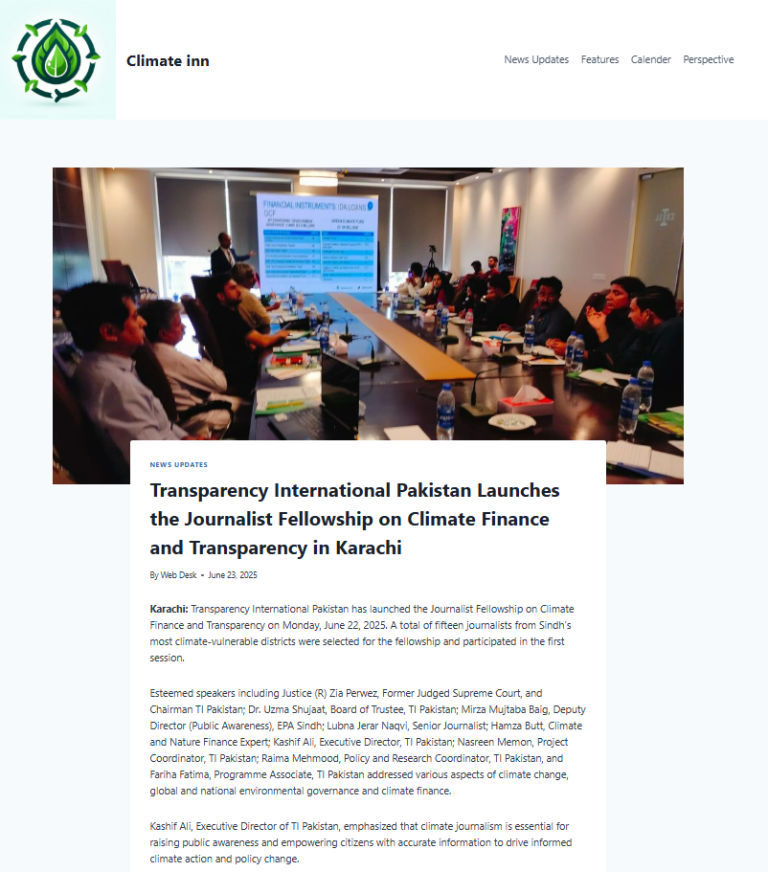Launch of Journalist Fellowship Programme on Climate Finance and Transparency
Launch of Journalist Fellowship Programme on Climate Finance and Transparency
Venue: Ramada Creek Hotel, Karachi
Date: Monday, June 23, 2025
Transparency International Pakistan formally launched six-month long Fellowship Programme for Journalists on Climate Finance and Transparency. The launching ceremony took place on Monday, June 23, 2025 at Ramada Creek Hotel, Karachi. The fellowship brought together 15 journalists from across the province. Experts specializing in climate change, governance, and journalism also participated in the training, providing in-depth insights, practical tools, and guidance to help journalists enhance their reporting and understanding of these critical issues.
The event formally commenced with the recitation of the Holy Quran, followed by a round of introductions. Prof. Dr. Uzma Shujaat, Board of Trustee, TI Pakistan welcomed the fellows and congratulated them on their selection for this prestigious fellowship program. She emphasized that this fellowship is one of the first of its kind in Pakistan, carefully designed by TI Pakistan after extensive thought and planning. She further explained that the fellows were selected not only for their expertise in the field, but also for their strong interest in reporting on climate governance and policies.
Next, Ms. Nasreen Memon, Project Coordinator, TI Pakistan delivered a presentation on Objectives of Journalist Fellowship on Climate Finance and Transparency. She explained that the fellowship aims to address the critical gap in climate reporting and oversight by equipping reporters with the necessary skills and knowledge to cover climate finance, policy, and governance effectively. The fellowship will also help journalists gain insights into the transparent allocation and implementation of climate funds, while also learning to leverage data-driven journalism to inform public discourse and hold stakeholders accountable.
Moving forward, Ms. Raima Mehmood, Policy and Research Coordinator, TI Pakistan, conducted a session on Climate Case of Sindh and its Worsening Vulnerability. She highlighted Sindh as one of the most climate-vulnerable regions in Pakistan, facing flooding, drought, heatwaves, and seawater intrusion. Besides the devastating floods of 2022, which submerged 12% of Sindh, chronic droughts also affect arid districts like Tharparkar and Umerkot, where social factors such as limited water access and land rights exacerbate vulnerability. Moreover, seawater intrusion has flooded 1.2 million acres of fertile land in Thatta and Badin, while mangrove forests have declined by over 30% from 1990 to 2020, further threatening the ecosystem of the Indus Delta.
Ms. Rasima also emphasized that journalists in high-risk areas like Sindh bring attention to neglected regions, exposing delayed government responses, aid gaps, and weak climate law enforcement. She also shared examples of in-depth news coverage during the 2022 floods, particularly from international media, highlighting how well-researched and impactful reports effectively captured the scope of the disaster. These reports not only provided critical insights into the devastation but also showcased the importance of thorough, responsible journalism in informing the public and driving global discussions on climate change and resilience. She concluded by sharing useful data tools and resources including PDMA/NDMA data portals, research reports like IGC Climate Vulnerability in Sindh (2025) and UN OCHA / ACAPS reports for gathering data, followed by an interactive activity where journalists participated in a challenge to create compelling climate story headlines.
Next, participants engaged in a group activity focused on the Climate Change Glossary for Journalists. Ms. Fariha Fatima, Programme Associate, TI Pakistan, led the group discussion on key terminologies commonly used in climate reporting. Fellows were divided into groups to discuss these terms and share relevant examples. Group leaders then presented on key terms such as the Benefit-Sharing Mechanism, Clean Development Mechanism (CDM), Greenwashing, Net Zero, REDD+, and Voluntary Carbon Markets and other key terms. Participants also shared their personal reporting experiences and referenced real-world examples to illustrate how these concepts are being covered through reporting.
After the tea break, Ms. Lubna Jerar Naqvi, Gender Coordinator, International Federation of Journalists (IFJ) Pakistan, spoke on Pakistan’s Climate Governance Frameworks. She provided an overview of the climate governance structure at both national and provincial levels, emphasizing the challenges faced by Sindh, including limited technical and financial capacity within local departments, weak enforcement of environmental regulations, and weak coordination between provincial and federal authorities.
Ms. Naqvi also highlighted the lack of public and media engagement in tracking climate finances, which undermines transparency and accountability. To address these issues, she stressed the need for clearly defined roles for federal and provincial governments in climate policies, the development of joint action plans for disaster response, and better systems for tracking climate spending.
Next, Mr. Mirza Mujtaba Baig, Deputy Director (Public Awareness), Sindh Environmental Protection Agency (SEPA), spoke on Environmental Protection Response and Public Awareness in Sindh. He defined climate awareness as understanding the causes and consequences of climate change, recognizing its global impact, and developing knowledge about mitigation and adaptation strategies. He underscored Sindh’s efforts to tackle climate change through policy development, public awareness campaigns, and inter-agency coordination. Mr. Baig informed participants that Sindh is the only province in Pakistan that has established Climate Change Directorate and have succeed to sell carbon credits, earning revenue through public-private partnerships like the Delta Blue Carbon project.
He further emphasized the vital role of civil society and media in raising public awareness through providing platforms for dialogue and community engagement, holding governments and corporations accountable for their environmental performance, and disseminating accurate, accessible information on climate change.
Afterwards, Mr. Kashif Ali, Executive Director, TI Pakistan provided a detailed presentation on Pakistan’s Climate Finance Landscape: Tools for Tracking, Monitoring and Reporting on Climate Finance by Journalists. He explained the concept of climate financing that includes funds to support mitigation (reducing emissions) and adaptation (adjusting to climate impacts). He provided an overview of the channels through which climate finance is received, as well as the key sectors where it is utilized, including renewable energy, climate-resilient infrastructure, water management, and disaster risk reduction.
Mr. Ali informed that In the FY 2025–26 budget, Pakistan has increased its mitigation funding by 183% (Rs. 603B), but adaptation was overlooked, receiving only Rs. 85.4B. He highlighted that while there is a shift towards green subsidies, high taxes on solar (18%) and EVs (8–18%) discourage clean energy adoption, conflicting with climate goals.
While speaking on the tools for tracking and monitoring, he discussed key transparency tools such as Climate Budget Tagging (CBT)— now integrated into Pakistan’s budget—allows reporters to track how public funds are allocated to climate-related activities. He explained in detailed how climate budget tagging is done in Pakistan, including the relevant ministry responsible for the tagging. Furthermore, he highlighted on the need to enhance journalists capacity on reporting around budget data. Journalist can flag if subsidies are given to sectors harmful for climate change. Budget monitoring also enables journalists to compare annual allocations and spending trends, helping to uncover gaps. And lastly, by accessing procurement data, journalists can highlight whether infrastructure and development projects deliver on their climate promises.
Participants then, were engaged in a group activity identifying mitigation and adaptation measures. They were divided into groups and were tasked with developing strategies for climate mitigation and adaptation and identifying various forms of climate finance.
Towards the end, Mr. Hamza Rafay Butt, Climate & Nature Finance expert (presently working at UNEP-WCMC) spoke on Understanding Global Climate Governance: Frameworks and Institutions.
He highlighted that Global Environmental Governance (GEG) refers to the system of international rules, institutions, processes, and actors that collectively manage and protect the environment. This governance is especially important today due to the “Triple Planetary Crisis” the world faces—climate change, pollution, and biodiversity loss—all of which are interconnected and require coordinated global solutions.
He highlighted that major milestones in climate governance include the 1992 Rio Earth Summit, the UN Framework Convention on Climate Change (UNFCCC), the Convention on Biological Diversity (CBD), and the UN Convention to Combat Desertification (UNCCD). The 1997 Kyoto Protocol (COP3) marked the first international treaty with legally binding emission reduction targets. The IPCC’s Fourth Assessment Report in 2007 played a vital role in bringing climate science into the public domain and was jointly awarded the Nobel Peace Prize. In 2015, the Paris Agreement (COP21) introduced universal climate action through country-led Nationally Determined Contributions (NDCs). Mr. Butt further pointed out that GEG is guided by principles like CBDR, Polluter Pays, and equity, with key players including the UNFCCC, IPCC, UNEP, GCF, GEF, governments, NGOs, and the private sector. However, implementation faces challenges like weak enforcement, limited funding, unequal responsibilities, and poor coordination. He also aware the participants about the key global finance institutions and key projects undergoing in Pakistan.
Through the training, the participants engaged with different speakers and raised questions regarding access to data, tools for monitoring climate finance, and approaches to reporting from a global climate perspective. In addition, they inquired about various aspects of the fellowship program as well.
The event concluded with briefing on the next steps of the fellowship, followed by concluding remarks by Justice (R) Zia Perwez, Chairman, TI Pakistan. He commended the participants for their active engagement throughout the day and recognized their crucial role in advancing transparency in climate action. He acknowledged the fellows’ dedication to responsible journalism and encouraged them to continue using their platforms to advocate for climate justice and informed public discourse.
The program wrapped up with a certificate distribution ceremony, acknowledging the participants’ active engagement and commitment during the orientation session.

